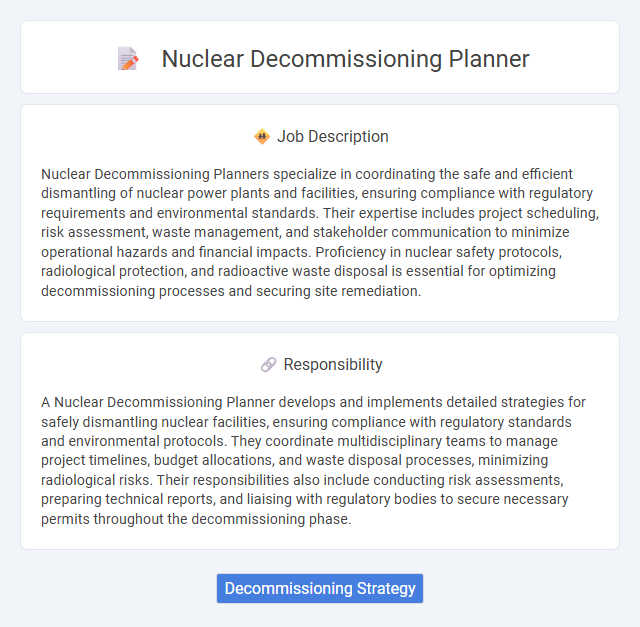
Nuclear Decommissioning Planners specialize in coordinating the safe and efficient dismantling of nuclear power plants and facilities, ensuring compliance with regulatory requirements and environmental standards. Their expertise includes project scheduling, risk assessment, waste management, and stakeholder communication to minimize operational hazards and financial impacts. Proficiency in nuclear safety protocols, radiological protection, and radioactive waste disposal is essential for optimizing decommissioning processes and securing site remediation.
Individuals with strong analytical skills and a meticulous attention to detail are likely to be suitable for a Nuclear Decommissioning Planner role given the job's complexity and safety requirements. Candidates who can manage high-pressure situations and demonstrate resilience may better handle the stress associated with decommissioning operations. Those lacking a solid technical background or the ability to work collaboratively in multidisciplinary teams may find the role challenging and less suited to their strengths.
Qualification
A Nuclear Decommissioning Planner typically requires a degree in nuclear engineering, environmental science, or a related field, along with professional certification in project management or nuclear safety. Experience in nuclear facility operations, waste management, and regulatory compliance is essential for successful planning and execution of decommissioning projects. Skills in risk assessment, cost estimation, and scheduling software like Primavera or MS Project enhance effectiveness in managing complex nuclear site closures.
Responsibility
A Nuclear Decommissioning Planner develops and implements detailed strategies for safely dismantling nuclear facilities, ensuring compliance with regulatory standards and environmental protocols. They coordinate multidisciplinary teams to manage project timelines, budget allocations, and waste disposal processes, minimizing radiological risks. Their responsibilities also include conducting risk assessments, preparing technical reports, and liaising with regulatory bodies to secure necessary permits throughout the decommissioning phase.
Benefit
A Nuclear Decommissioning Planner likely offers substantial benefits such as enhanced expertise in managing complex projects and improved career stability within the specialized energy sector. This role probably provides opportunities to work on cutting-edge safety and environmental protection initiatives, increasing professional value. Compensation packages may include competitive salaries and specialized training, attracting professionals seeking long-term growth in the nuclear industry.
Challenge
Nuclear Decommissioning Planners are likely to encounter complex logistical and regulatory challenges throughout the process of safely dismantling nuclear facilities. The role probably requires navigating stringent safety standards and environmental regulations, demanding meticulous planning and risk assessment. It appears that anticipating unforeseen technical difficulties and managing resource allocation efficiently are key obstacles inherent to this position.
Career Advancement
Nuclear Decommissioning Planners play a critical role in safely dismantling nuclear facilities, offering extensive expertise in regulatory compliance and project management. Career advancement opportunities include progressing to senior planner, project manager, or regulatory affairs specialist roles, leveraging experience in risk assessment and environmental safety. Mastery of industry standards such as NRC and IAEA regulations enhances prospects for leadership positions within nuclear energy companies or government agencies.
Key Terms
Decommissioning Strategy
A Nuclear Decommissioning Planner develops comprehensive decommissioning strategies to safely dismantle and manage nuclear facilities, emphasizing regulatory compliance and environmental protection. They analyze technical, financial, and logistical data to optimize project timelines and minimize radiological risks. Expertise in waste management, site remediation, and stakeholder engagement ensures effective execution of decommissioning plans aligned with industry standards.
 kuljobs.com
kuljobs.com